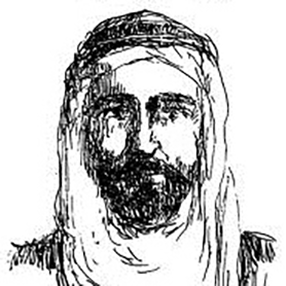From “Muʻallaqāt” [Canst thou make me immortal]
Canst thou make me immortal, O thou that blamest me so
For haunting the battle and loving the pleasures that fly?
If thou hast not the power to ward me from Death, let me go
To meet him and scatter the wealth in my hand, ere I die.
Save only for three things in which noble youth take delight,
I care not how soon rises o’er me the coronach loud:
Wine that foams when the water is poured on it, ruddy, not bright,
Dark wine that I quaff stol’n away from the caviling crowd;
And then my fierce charge to the rescue on back of a mare
Wide-stepping as wolf I have startled where thirsty he cowers;
And third, the day-long with a lass in her tent of goat’s hair
To hear the wild rain and beguile of their slowness the hours.
This poem is in the public domain. Published in Poem-a-Day on April 14, 2024, by the Academy of American Poets.
“[Canst thou make me immortal]” is a poem featured in the anthology Translations of Eastern Poetry and Prose, edited by Reynold A. Nicholson (Cambridge University Press, 1922). Nicholson observed, “The following lines from his Mu‘allaka [sic] illustrate the pre-Islamic view of life as well as the character of the poet who was cut off in the flower of his days.” Nicholson also notes, “For the translation of this verse I am indebted to Mr. Wilfrid Scawen Blunt, in whose beautiful version of the Mu‘allakdt [sic] it is rendered thus: ‘And third, to he the day-long, while wild clouds are wildering, close in her tent of goat’s hair, the dearest beloved of me.’” In Arabian Poetry for English Readers (M‘Laren and Son, 1881), editor William Alexander Clouston wrote, “The occasion which gave rise to his Mu‘allaqa [sic]—the loss of the camels belonging jointly to himself and his elder brother—is related in the translator’s Argument. [Caussin] de Perceval states that ‘Amr the son of Marthad, one of the noble chiefs whom the poet compliments in [verse] 81, sent for Tarafa, and said to him: ‘Children God alone can give thee; but as to goods I will set thee on the same footing with my own sons.’ He then called each of them to give the poet ten camels; thus making good the loss upon which his brother had so bitterly reproached him.”

